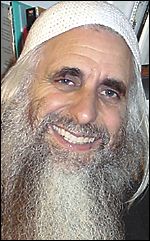Rabbi Menachem Froman | Israel/Palestine

At the edge of the Judean desert resided Orthodox Rabbi Menachem Froman. As a founder of the Gush Emunim settler movement in the West Bank, some people may be surprised that Froman has been called the “wise one” by Yasser Arafat and an “Israeli hero” by Sheikh Talal Sider, a former Hamas sympathizer. But for those who know his work, these words of praise are simply proof of Froman’s firm belief that regular meetings with the “other” build trust. In fact, with his religious sensibility and commitment to peace, Rabbi Froman dedicated most of his life to promoting reconciliation between Jewish settlers and Palestinian residents in the West Bank and Gaza.
The same year as the 1973 Yom Kippur War, it was a young Rabbi Froman who completed his studies and decided to make his home in the West Bank settlement of Tekoa, where he would eventually become Chief Rabbi and raise 10 children. He and his fellow settlers came with the intention to learn Arabic and live in peace, and he fully expected that the Palestinians would be glad to see them come. Yet Rabbi Froman was soon to recognize a different reality.
The violence during the First Intifada served as a wake-up call through which he came to better understand the impact of the Jewish settlements. With the land he loved defining his perspective, he began working toward his vision of a “humane state,” in which Israel and Palestine, as two states, would rule simultaneously over the Holy Land. Froman envisioned Palestinians and Israelis each enjoying full independence while living on the same land, conducting business together and not giving way to violence. Later, he would expand on that concept with the idea that Jerusalem should become ex-territorial, a city for all religions and all people.
Recognizing the urgent need to reach across the divide, Rabbi Froman quickly established relationships with both Israeli and Palestinian leaders. Several months after the Second Intifada broke out, Yasser Arafat invited Rabbi Froman to his presidential palace in Ramallah. President Arafat listened as Froman made a case for the establishment of a joint committee of Sheikhs and Rabbis devoted to creating a solution for peace. In response, both Arafat and Prime Minister Ariel Sharon gave their approval. Soon after, Rabbi Froman and Sheikh Talal Sider established a joint council of Jewish and Muslim clerics to work for peace.
Beyond his groundbreaking introductions, Froman was a key mediator in conflicts, serving as a respected advisor to groups from diverse backgrounds and opposing political affiliations. In 2002, his efforts helped to bring about the Alexandria Summit, which convened prominent Jewish, Muslim, and Christian clerics and produced the groundbreaking “First Alexandria Declaration of the Religious Leaders of the Holy Land.”
Ultimately, Froman described the conflict in this region in the simplest of terms as a tragedy of “two peoples loving the same land.” Through his commitment to a new era of mutual recognition and cooperation, Rabbi Froman continued to open new channels of communication between the two sides, always hoping that they would lead to his vision of a “humane state” in the Holy Land.
Rabbi Froman transcended politics by connecting with all sides on a spiritual level, seeking common ground in a shared faith in God. He told the Israeli newspaper Haaretz, “Ahmed Yassin once told me: You and I could make peace in hamsa dakika − five minutes. How so? Because we are both believers.” He was instrumental in organizing a group of such believers for the 2002 Alexandria Summit, which gathered Muslim, Jewish and Christian leaders to produce the “First Alexandria Declaration of the Religious Leaders of the Holy Land.” Indeed, throughout his many decades of building peace, he always believed that the religious element must play a central role in the process.
On March 4, 2013, Rabbi Menachem Froman lost a long battle with cancer. He left behind his wife Hadassah, 10 children, and a community of students, followers, and peacemakers of all religions. His peacebuilding legacy continues, as he is frequently still mentioned in articles and documentaries. Click here to read Rabbi Froman’s memorial page.
Rabbi Menachem Froman, Israel/Palestine